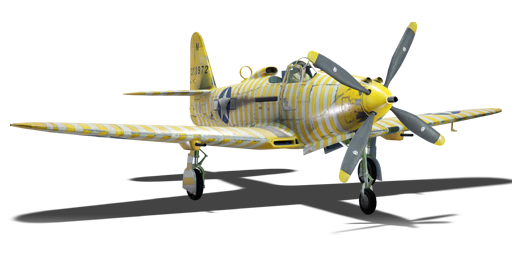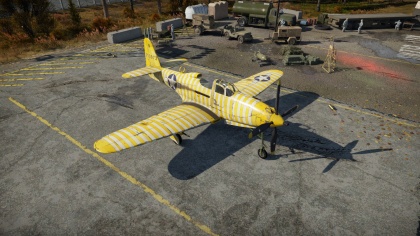Difference between revisions of "P-63C-5"
(Restored page from version archived 12-01-19.) |
(Edits.) |
||
| Line 3: | Line 3: | ||
|cockpit=332107/1100869 | |cockpit=332107/1100869 | ||
}} | }} | ||
| − | {{ | + | {{About |
| + | | about = American fighter '''{{PAGENAME}}''' | ||
| + | | usage = other uses | ||
| + | | link = P-63 (Family) | ||
| + | }} | ||
== Description == | == Description == | ||
Revision as of 18:03, 6 April 2019
Contents
| This page is about the American fighter P-63C-5. For other uses, see P-63 (Family). |
Description
The P-63C-5 Kingcobra is a Rank III American fighter
with a battle rating of 4.0 (AB/RB) and 4.7 (SB).
General info
Flight Performance
| Characteristics | |||||||
|---|---|---|---|---|---|---|---|
| Stock | |||||||
| Max Speed (km/h at 4,572 m) |
Max altitude (meters) |
Turn time (seconds) |
Rate of climb (meters/second) |
Take-off run (meters) | |||
| AB | RB | AB | RB | AB | RB | ||
| 640 | 626 | 12500 | 24.2 | 24.5 | 16.7 | 18.8 | 289 |
| Upgraded | |||||||
| Max Speed (km/h at 4,572 m) |
Max altitude (meters) | Turn time (seconds) | Rate of climb (meters/second) |
Take-off run (meters) | |||
| AB | RB | AB | RB | AB | RB | ||
| 708 | 663 | 12500 | 22.3 | 23.0 | 32.9 | 21.7 | 289 |
Details
| Features | ||||
|---|---|---|---|---|
| Combat flap | Take-off flap | Landing flap | Air brakes | Arrestor gear |
| ✓ | ✓ | ✓ | X | X |
| Limits | ||||
|---|---|---|---|---|
| Wing-break speed (km/h) |
Gear limit (km/h) |
Combat flap (km/h) |
Max Static G | |
| + | - | |||
| 0 | 304 | 480 | ~15 | ~7 |
| Optimal velocities | |||
|---|---|---|---|
| Ailerons (km/h) |
Rudder (km/h) |
Elevators (km/h) |
Radiator (km/h) |
| < 430 | < 430 | < 419 | > 250 |
| Compressor (RB/SB) | ||
|---|---|---|
| Setting 1 | ||
| Optimal altitude | 100% Engine power | WEP Engine power |
| 7,000 m | 1,100 hp | 1,705 hp |
Survivability and armour
- 15.87 mm Steel - Plates x 2, lower fore cockpit
- 19.05 mm Steel - Plate, upper fore cockpit
- 12.7 mm Steel - Plate behind pilot's seat
- 12.7 mm Steel - Plate protecting oil cooling system
- 38 mm Bulletproof glass - Windscreen
Armaments
Offensive armament
The P-63C-5 is armed with:
- 1 x 37 mm M10 cannon, nose-mounted (58 rpg)
- 2 x 12.7 mm Browning M2 machine guns, nose-mounted (250 rpg = 500 total)
- 2 x 12.7 mm Browning M2 machine guns, wing-mounted (200 rpg = 400 total)
Suspended armament
The P-63C-5 can be configured with the following ordinance:
- Without load
- 3 x 500 lb AN-M64A1 bombs (1,500 lb total)
Usage in the battles
This aircraft is an improved version of the previous Kingcobra carrying the same armament and main gun. The aircraft is still a high altitude interceptor/ Energy fighter, with it's turn radius slightly better than before. The quick dive speed and high energy retention allows the player, with the correct altitude, to engage opponents below numerous times using the high yo-yo method. This aircraft should not be used for ground attacking due to it's average ammo count.
The 37mm M10 cannon is ridiculously powerful. Aim carefully when firing, and do not fire too quickly, lest your gun jam and you lose your main weapon. A single shot to a wing or fuselage of an enemy plane will be all that it takes to bring it down.
The M2 Brownings are similar to the guns on the Bf-109- spotters. Use them to judge the range for your cannon shot. They are almost useless (except for those lucky pilot kills) offensively.
Unfortunately, the C-5 is relatively superior to its predecessors. It has far more cannon ammo , and a slightly lower climb rate than the A-10. However, this is relatively trivial as both planes are generally evenly matched. Keep this in mind, though, when selecting your load out of planes.
It is recommended to use the P-63 against large fighters and bombers. It is far easier to hit a bomber with the cannon then a small fighter with it.
Head-on attacks are not advisable- the large cannon combined with the relatively weak M2s make for poor head on accuracy. Only engage in head-ons if you are absolutely confident in your aim.
BnZing is also an effective tactic with this plane. It's large cannon makes getting shots while diving relatively easy, and its high climb rate and energy retention can get it to safety.
Bomber hunting is also extremely effective with the P-63- a large bomber is far easier to hit with a massive cannon. A single shot can take off a bomber's wing. However, don't spam the cannon. Keep the delay between shots at a 1-1.5 seconds. Firing too quickly will result in a jam, which makes your plane almost useless offensively.
Manual Engine Control
| MEC elements | ||||||
|---|---|---|---|---|---|---|
| Mixer | Pitch | Radiator | Supercharger | Turbocharger | ||
| Oil | Water | Type | ||||
| Controllable | Not controllable | Not controllable | Controllable | Combined | Not ontrollable | Not controllable |
Modules
Initially, the aircraft's flat speed is not fast enough to outrun Fw 190 A and F 8s that it may face, so it's recommended to upgrade engine performance first. Armament, although it won't improve greatly, is the next recommendation considering how underwhelming it may be on some occasions- do this by researching ammo belts, then improvements to the cannon.
| Tier | Flight performance | Survivability | Weaponry | ||
|---|---|---|---|---|---|
| I | Fuselage Repair | Radiator | Offensive 12 mm | ||
| II | Compressor | Airframe | New 12 mm MGs | FMBC mk.1 | |
| III | Wings Repair | Engine | Offensive 37 mm | ||
| IV | Engine Injection | Cover | New 37 mm cannons | ||
Pros and cons
Pros:
- Excellent dive speed
- Excellent energy retention
- Better-than-average climb rate
- Good flat out speed
- Good cannon damage
Cons:
- Average turn time
- Worse-than-average performance at low speeds
- Ineffective armament against higher tier aircraft
- Prone to engine damage when being chased
- Default paint scheme makes the aircraft visible at longer distance
- Rudder locks at high speed making it hard to get guns on target in BnZ
History
Describe the history of the creation and combat usage of the aircraft in more detail than in the introduction. If the historical reference turns out to be too big, take it to a separate article, taking a link to an article about the vehicle and adding a block "/ historical reference" (example: https://wiki.warthunder.com/Name-vehicles/historical reference) and add a link to it here using the main template. Be sure to include links to sources at the end of the article.
Media
An excellent addition to the article will be video guides, as well as screenshots from the game and photos.
Read also
Links to the articles on the War Thunder Wiki that you think will be useful for the reader, for example,
- reference to the series of the aircraft;
- links to approximate analogues of other nations and research trees.
Sources
Paste links to sources and external resources, such as:
- topic on the official game forum;
- page on aircraft encyclopedia;
- other literature.
| USA fighters | |
|---|---|
| P-26 Peashooter | P-26A-33 · P-26A-34 · P-26A-34 M2 · P-26B-35 |
| P-36 Hawk | P-36A · Rasmussen's P-36A · P-36C · ○P-36C · P-36G |
| P-39 Airacobra | P-400 · P-39N-0 · P-39Q-5 |
| P-40 | P-40C · P-40E-1 · P-40E-1 TD · P-40F-10 |
| P-43 Lancer | P-43A-1 |
| P-47 Thunderbolt | P-47D-22-RE · P-47D-25 · P-47D-28 · P-47M-1-RE · ⋠P-47M-1-RE · P-47N-15 |
| P-51 Mustang | P-51 · P-51A (Thunder League) · P-51C-10 · P-51D-5 · P-51D-10 · P-51D-20-NA · P-51D-30 · P-51H-5-NA |
| P-63 Kingcobra | P-63A-5 · P-63A-10 · P-63C-5 · ␠Kingcobra |
| Prototypes | XP-55 |
| F2A Buffalo | F2A-1 · Thach's F2A-1 · F2A-3 |
| BF2C | BF2C-1 |
| F3F | F3F-2 · Galer's F3F-2 |
| F4F Wildcat | F4F-3 · F4F-4 |
| F4U Corsair | F4U-1A · F4U-1A (USMC) · F4U-1D · F4U-1C · F4U-4 · F4U-4B · F4U-4B VMF-214 · F2G-1 |
| F6F Hellcat | F6F-5 · F6F-5N |
| F8F Bearcat | F8F-1 · F8F-1B |
| Other countries | ▃Ki-43-II · ▃Ki-61-Ib · ▃A6M2 · ▃Bf 109 F-4 · ▃Fw 190 A-8 · ▃Spitfire LF Mk IXc |





